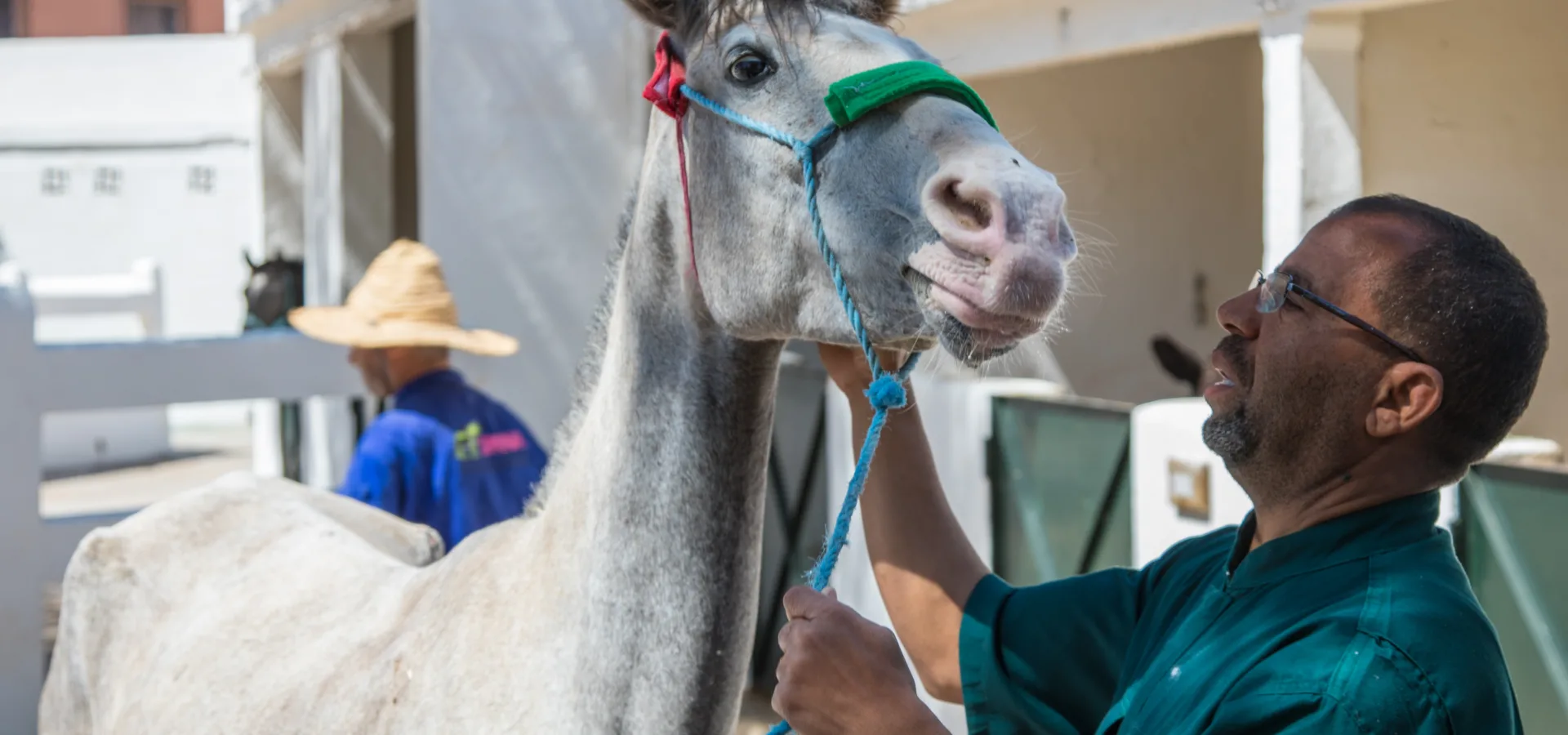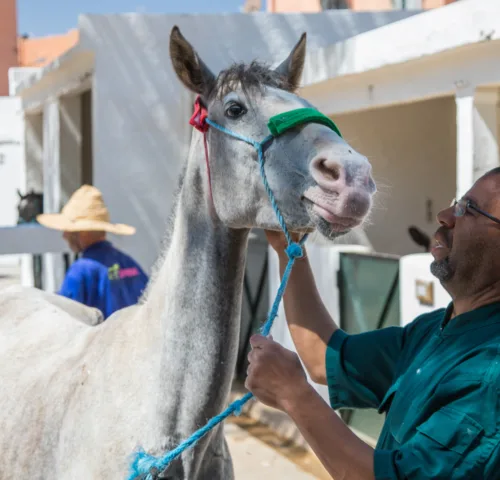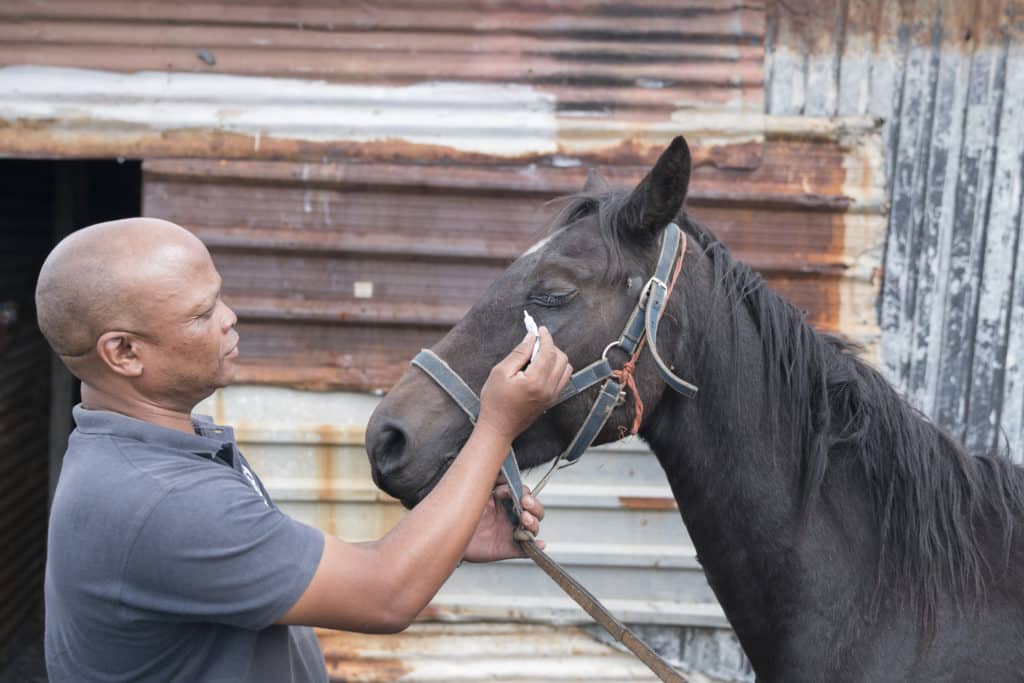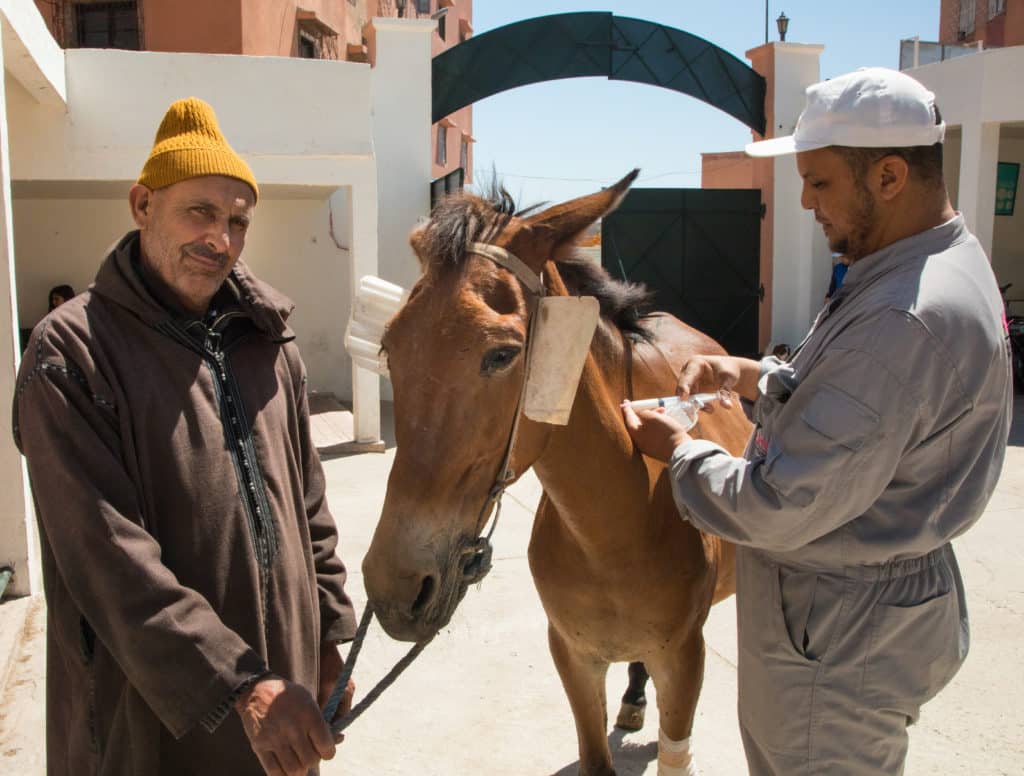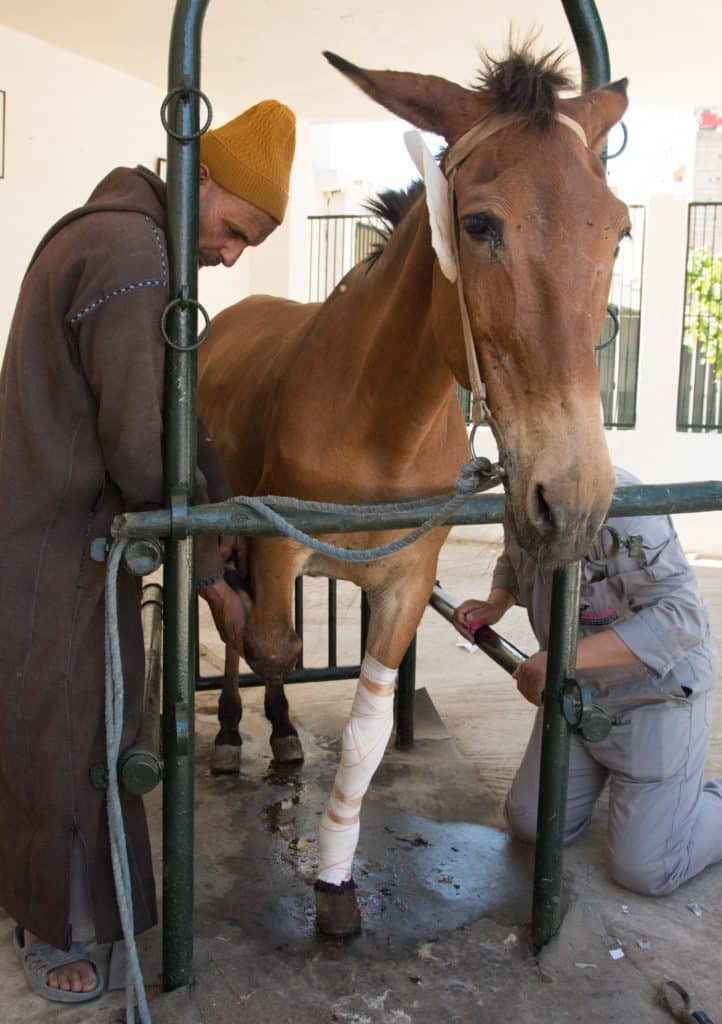Sadly, health problems can occur in all breeds of horse, regardless of how well cared for they are. Some can be avoided. However, some conditions have no obvious cause. To help owners know what to look out for, we’ve put together a guide on some of the most common diseases and skin conditions that can affect horses.
If you’re concerned about any change in your horse’s behaviour or physical appearance, it’s important to consult a vet. They will know what to do and will offer the best advice and treatment for your horse.
Common horse diseases
Like humans, there are a huge number of diseases, conditions and illnesses that can affect horses. Some of these can be prevented through vaccinations, and spotting signs of disease and other problems early can avoid serious consequences. The conditions below are common in horses in many countries across the world and ones which owners should be aware of.
Colic
Colic is a term used to describe abdominal pain and usually refers to problems in the gastrointestinal tract. There are many different types of intestinal problems that cause colic symptoms, ranging from mild to life-threatening in the worst cases. One of the most common types is spasmodic colic, which can be caused by excess gas. Alternatively, impaction colic may be caused by a build-up of dry or coarse feed in the gut among other reasons. There can also be more serious causes like a twisted or ruptured gut. Typical symptoms of colic include:
- Abdominal pain – horses may kick at their belly or frequently look at their flanks, lie down, scrape the ground or roll on the ground
- Anxiety and restlessness
- Unexplained sweating and odd breathing
- Lack of appetite or bowel movements
- Wanting to spend more time in water or playing with a water bucket, but not drinking from it
- Elevated pulse rate and temperature
Arthritis
There are different types of arthritis that can affect horses, such as traumatic, degenerative or infectious arthritis. Equine arthritis usually manifests as swelling and inflammation of the joints. This often prevents the horse from moving comfortably and freely without pain, so there is often visible lameness.
Degenerative joint disease (also known as osteoarthritis) is usually chronic and progressive, resulting from the deterioration of cartilage in the joints, and frequently results in lameness. Certain veterinary procedures and anti-inflammatory medication can help, but it normally requires lifelong management.
Laminitis
Laminitis is an inflammation of the laminae in the horse’s foot (laminae are the tissues that attach the coffin bone to the wall of the hoof). It can be a very serious disease. While it more commonly affects the front hooves, it is possible for the hindfeet or even all four to become affected, which is very painful for the horse.
Horses that are considered obese or have other endocrine disorders may be more prone to laminitis. Spotting the condition early on is the best way to treat it. Symptoms include:
- Lameness
- Inability or reluctance to walk or move
- Increased preference to lie down and unwillingness to get up
- Rocking back onto hind feet to relieve pressure from the toe area of the foot
Diseases caused by mosquito bites
Mosquitoes carry various viruses that can harm horses, most commonly in hot climates.
Equine encephalomyelitis – also known as sleeping sickness – affects the central nervous system. There are several types of the disease, but typically symptoms may include:
- Neurological signs, such as aimless wandering or involuntary movement
- Fever
- Lack of coordination
- A drooping lip
- Grinding of the teeth
In severe cases, symptoms can include an inability to swallow, seizures, paralysis, and even death. However, if owners vaccinate their horses, the disease can be avoided.
West Nile virus is also transmitted through a mosquito bite, potentially causing inflammation of the brain. Symptoms of an infected horse include:
- Fever
- Impaired vision
- Convulsions
- Head pressing
- Difficulty swallowing
- Lack of coordination
- Weakness of hind limbs
This disease and others that are common in mosquito-ridden areas can be prevented though vaccination, which is crucial.
Tetanus (lockjaw)
Tetanus is a serious disease caused by a bacterial toxin – also known as lockjaw – that affects a horse’s nervous system. Typical symptoms include:
- Heightened sensitivity
- Stiffness
- Protruding third eyelid
Tetanus can be avoided through vaccinations.
Botulism
Botulism is a bacterial toxin disease that can be life-threatening. Here are some of the ways horses can become infected:
- Botulism from spoiled hay, wet or dry
- Botulism from hay contaminated with an animal carcass
- Botulism from a wound
Horses most commonly contract botulism by eating contaminated hay. It is extremely important that owners recognise any symptoms of botulism as it can be deadly. Things to look out for include:
- Muscle weakness, often visible in the tongue
- Weak or droopy eyelids
- Flaccid paralysis
- Dysphagia – difficulty swallowing
Horses with botulism may also have a swollen face and muzzle from having the neck low, trembling muscles, and an inability to hold up their head.
Azoturia
Azoturia (sometimes known as Monday morning disease or ‘tying up’) is a condition that affects a horse’s muscles, causing problems like cramping, stiffness, high temperature or elevated heart rate. Usually affecting horses used in sport, it is often caused by a horse being overexerted and left without any changes to its diet.
Sometimes the pain can be so bad that horses find it difficult to stand. A good supportive treatment may ease this pain and help recovery. Azoturia can be prevented by carefully managing the horse’s exercise and diet plans.
Cough
Coughs can be infectious (bacterial, viral or parasitic), or non-infectious, including equine asthma. Coughs resulting from allergic reactions are often caused by dust, so it’s important to make sure stables are well ventilated and that bedding is dust-free.
Equine herpes
The herpes virus can cause respiratory difficulties, miscarriage and neurological problems in horses depending on the type of herpes virus. Horses can be vaccinated before they catch the virus, but symptoms to look out for otherwise are a fever, cough, nasal discharge and loss of appetite. This is extremely contagious.
Skin conditions in horses
Unfortunately, skin conditions in horses are also common. Some can be infectious and so catching them early on is vital in protecting the health of other horses and animals. Some of the most common skin conditions in horses are listed below:
- Ringworm –Ringworm is a contagious fungal infection in horses that typically presents as circular, scaly, or bald patches. These lesions may vary in size but are usually found around the head, neck, saddle, and girth regions.
- Rain Scald – This is a bacterial skin infection in horses, often associated with moisture softening the skin and making it prone to infection. Horses with weakened immunity or in poor condition are particularly susceptible to rain scald. Poor air circulation, leaking or non-breathable turnout rugs, or constant moisture from rain or sweat can be the cause. Owners should look out for patchy hair loss and flaky skin along the back and quarters, matted hair, sores, and weeping lesions.
- Mud fever – Caused by a bacterial infection, mud fever is most common in the winter months when conditions are wet and muddy. Symptoms include inflamed and scaly skin on the legs, typically at the back of the pasterns. In extreme cases, it may cause a fever. Bacteria can enter wet skin, causing crusty scabs and scaly skin on horses’ legs and sealing in the infection. Ensuring legs are cleaned and dried properly after being outside can help avoid mud fever.
- Sweet itch – Midges (known as culicoides) cause allergic reactions when they bite horses. This results in flaky skin and inflammation, making the horse’s back, mane, and tail particularly itchy. Horses usually rub themselves to relieve the itching. The best course of action is to apply a vet-recommended repellent and keep the horse inside during dawn and dusk to avoid midge bites.
- Aural plaques – Equine aural plaques are found inside the ears and are usually flat, crusty and white. Fortunately, these aren’t usually painful and are purely cosmetic. However, biting flies may irritate the lesions, causing pain to the horse.
- Dandruff – Also known as seborrhea in horses, dandruff can be dry or oily. Dry dandruff appears as small flakes of skin, usually at the base of the mane and tail, while oily dandruff forms larger, waxy crusts often on the elbows, hocks, or lower legs. These may leave large hairless patches when peeled off. The dry skin and dandruff can be due to underlying conditions that may require veterinary management.
- Nodules – There are many possible causes for skin nodules but allergic reactions to insects are thought to be the most common cause of nodules. Skin nodules are growths or swellings under the skin – usually in the neck, back and withers. Nodules aren’t usually painful or itchy but may occasionally be so depending on their cause. Thankfully, most allergic nodules are harmless and will reduce naturally. However, vets may want to shrink or surgically remove them if they suspect other causes.
- Mange – Several species of mites can cause mange – a parasitic infection. They appear initially as small, round bumps and turn into bald spots with scaly, thickened skin. Mange can be extremely irritating and itchy; horses may rub, stamp or bite at the areas affected. Mange must be treated and there are products to help, but veterinary advice is essential. Mites can pass from horse to horse, so it’s important to isolate an animal if they are found to be infected.
- Lice – like humans and other animals, horses can suffer from lice. Having lice is extremely itchy and horses may experience hair loss due to excessive rubbing. There are two types of lice than can infect horses: chewing lice and biting lice. Chewing lice feed on dead skin cells, whereas biting lice feed on blood. Owners must isolate horses and treat the lice, otherwise it can spread rapidly.
At SPANA, we help working animals of all species – including horses and donkeys – in many of the world’s most impoverished communities. As well as providing lifesaving veterinary care and vaccinations to animals in need, we also improve the welfare of working animals by training owners in basic animal care and teaching animal welfare lessons to children.
We’ve been improving the lives of working animals around the world since 1923, and we rely on donations from our kind supporters to continue our vital work. You can make a one off donation or become an ongoing Stable Sponsor to support animals receiving essential care at our centres in low-income countries worldwide.

